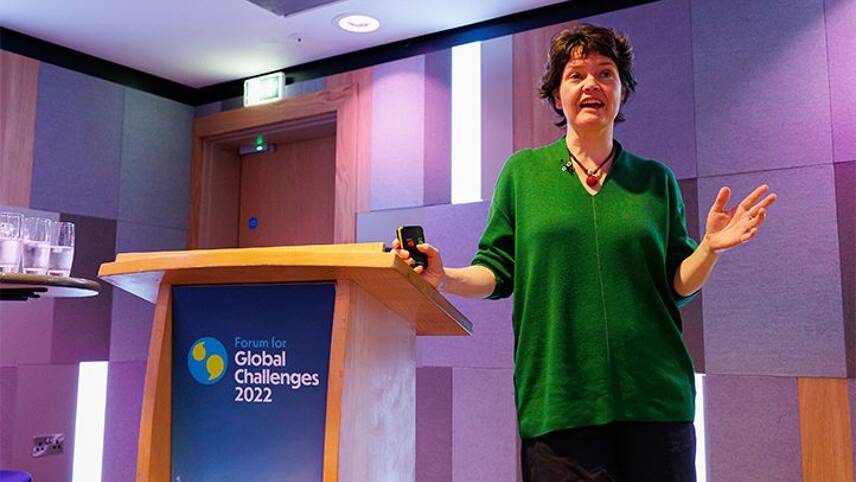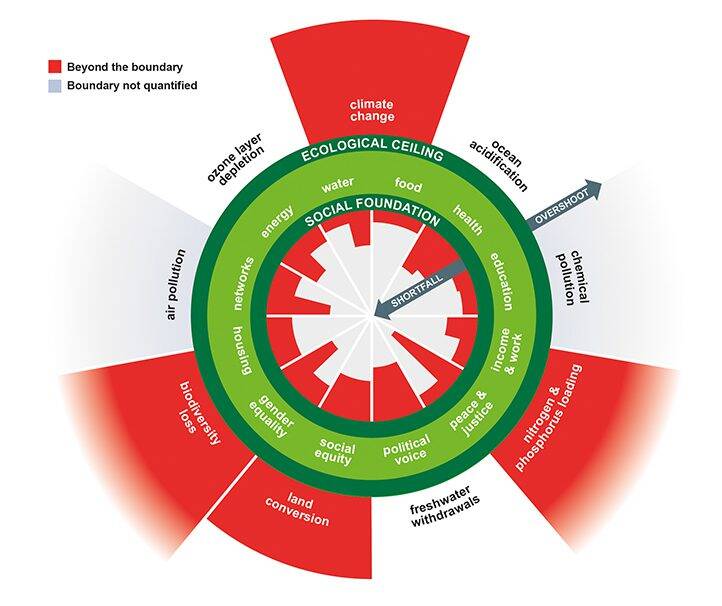Register for free and continue reading
Join our growing army of changemakers and get unlimited access to our premium content

Raworth spoke with edie at the inaugural Forum for Global Challenges event in Birmingham. Photo courtesy of Alistair Veryard
Speaking to edie at the Forum for Global Challenges event in Birmingham this week, Raworth – who coined the popular Doughnut Economics theory for sustainable development – said there is a real danger of net-zero becoming “just another piece of jargon” as many firms continue to operate based on linear, extractive business models.
“Nature doesn’t do ‘zero’,” Raworth said. “Nature is generous, it sequesters carbon, it creates cycles. The idea of aiming for ‘zero’ doesn’t connect us back with those living cycles of the world.
“The fact that a lot of the debates have become caught up in the concept of net-zero presents a real myopia in terms of understanding how we connect with the living world. I see net-zero as a passing point… We need to go past zero into an era of sequestration where we are drawing down far more carbon than the world is emitting.”
The Doughnut Economy
Raworth’s Doughnut Economics model is based on the premise that all economies must fall within the means of the planet. The inner ring of the doughnut represents the minimum standards required for a flourishing society, derived from the Sustainable Developments Goals (SDGs). The outer ring represents the ecological ceiling drawn up by earth-system scientists.

Source: kateraworth.com/doughnut
Between the two rings – the dough – is where governments and businesses should be operating, with the needs of people and the planet being met. But this is where economies that focus solely on net-zero principals will fall short, Raworth argues.
“If we come up with net-zero policies which actually degrade ecological diversity, then we’re not solving [the climate crisis] at all because we are not recognising the complexity and the holistic nature of our planetary boundaries,” she added.
“Businesses should aim to be net-positive, they should aim to be generous. I like to think in terms of generous design – we can build buildings that clean the air and put cleaner air back into our systems, we can create industrial systems that can put cleaner water back out, and we can build in ways that sequester carbon.”
Regenerative futures
At a government level, Raworth – who is a lead fellow at the Oxford University’s Environmental Change Institute – noted that the current invasion of Ukraine and the UK’s cost-of-living crisis “are signs that we need to transform the economic systems that we’ve created”.
“The fuel price crisis is a very strong signal that we should move even faster out of fossil fuels and towards renewable energy,” she said. “That shifts you towards low, stable, predicable prices from renewable energy, as opposed to being continually exposed to the variability of geopolitics of fossil fuel prices.”
And at a business level, Raworth stressed the need to ensure sustainability runs through every organisation’s hierarchy – from the owners and investors through to the board and staff.
“If you’re in a company that is owned and financed in ways that put quarterly reports and growth and extraction for the shareholders first, it’s extremely difficult to show that you’re going to be part of a regenerative and distributive future.
“Equally, if sustainability is buried in a department at mid-management level and it doesn’t have a voice on the board, that business is not fit for the future because the regenerative capacity of the living world has to have a voice at the governance table of every company.”
Circular Economy Week 2022
Sustainable business models will be a key focus of edie’s Circular Economy Week 2022 (23–27 May) – a themed week of premium digital content and events dedicated to supporting sustainability, energy and resource efficiency professionals in accelerating the transition to an economy free from waste and single-use plastics.
The Week will include a free online event – The Circular Economy Inspiration Sessions – taking place on the afternoon of Thursday 26 May. Find out more and register to attend the virtual event, here.


Please login or Register to leave a comment.